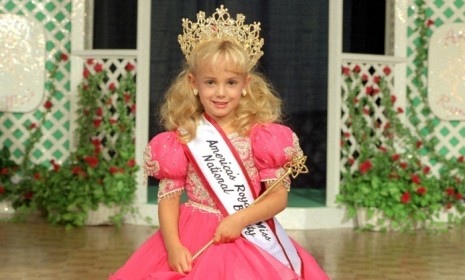5 reasons child pageants are bad for kids
The father of murdered child pageant contestant JonBenet Ramsey regrets letting her compete in beauty contests — and calls Toddlers and Tiaras "bizarre"

A free daily email with the biggest news stories of the day – and the best features from TheWeek.com
You are now subscribed
Your newsletter sign-up was successful
John Ramsey and his family skyrocketed to national prominence in 1996, when Ramsey's 6-year-old daughter JonBenet, a frequent child pageant contestant, was found murdered. (The case was never solved.) Now, in an interview with Good Morning America, Ramsey concedes that he was wrong to put JonBenet in pageants in the first place. It's just a bad idea "to put your child on public display," he says. And shows like Toddlers and Tiaras that chronicle child pageants are "bizarre," Ramsey says, as pageants encourage young children to develop problematic levels of competitiveness, and focus too much on their appearance. Ramsey's warning brings to light an ongoing debate about the detrimental effects that pageants can have on children. Here, five more reasons why pageants are bad for children:
1. The girls are too young to say no
"There are examples of young girls screaming in terror as their mothers approach them with spray cans," Australian lawmaker Anna Burke tells the Sydney Daily Telegraph. Clearly, pageants risk "the exploitation or potential exploitation of very young children who really do not have the capacity to express their own views."
The Week
Escape your echo chamber. Get the facts behind the news, plus analysis from multiple perspectives.

Sign up for The Week's Free Newsletters
From our morning news briefing to a weekly Good News Newsletter, get the best of The Week delivered directly to your inbox.
From our morning news briefing to a weekly Good News Newsletter, get the best of The Week delivered directly to your inbox.
2. Pageants sexualize young girls
French lawmakers want an all-out ban on child pageants, says Henry Samuel in Britain's Telegraph, accusing the media and reality TV of "promoting stereotypes that transform young girls into 'sexual morsels.'" Just look at the growing number of "schoolgirls as young as 8 [who] wear padded bras, high heels, or makeup, and strike suggestive poses." Really, what is this telling our children about how they present themselves to society?
3. They cause cognitive and emotional problems
A 2007 report by the American Psychological Association found that the hypersexualization of young girls is strongly associated with eating disorders, low self-esteem, and depression, says Melissa Henson at CNN. It can also even lead to fewer girls pursuing careers in science, technology, engineering, and mathematics.
A free daily email with the biggest news stories of the day – and the best features from TheWeek.com
4. Too much hair spray can stunt growth
One of the most widely used products in child pageants is hair spray, which contains phthalates, or plasticizers, that can act as hormone disruptors, says Travis Stork of CBS's The Doctors. For an adult beauty contestant, this is no biggie. But for a growing girl, the effects could prove detrimental. Excessive exposure to phthalates has been linked to stunted growth and even lung cancer.
5. High heels aren't made for small feet
If you're Suri Cruise, wearing high heels as a toddler is just a part of life. But when little pageant contestants wear heels, Stork says, it unnecessarily pushes their weight forward, causing lower back pain and hindering proper development of the feet. In some cases, these girls are forced to continue wearing heels outside of pageants because their feet have grown in a way that makes wearing other kinds of shoes very uncomfortable.